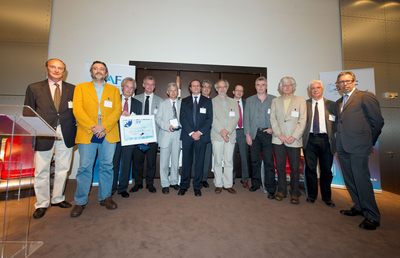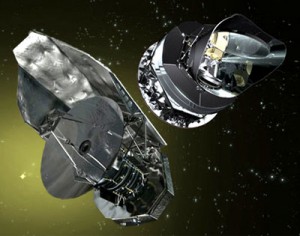
The teams behind Planck and Herschel have been awarded the “Grand Prix 2010” by the French Association for Aeronautics and Astronautics (AAAF), to acknowledge their “outstanding space endeavours”. The prize was awarded on 9th June 2010 in Paris, and senior members of the teams behind both of these groundbreaking missions were there to collect the award on behalf of both collaborations.
“As with any great engineering project, it was a challenge not only to ESA’s scientific and technical staff, and scientific teams across Europe but also to teams from industry across Europe led by Thales Alenia Space who took on the prime engineering task a decade ago”, says David Southwood, Director of Science and Robotic Exploration at ESA. “It has been a great adventure for everyone involved with heights of great elation but also plenty of the nightmares that implementing cutting-edge technology can always throw up. Now the proof of the quality of the work and the worth of the effort is in the tremendous new science now emerging from the two missions”.

This is just the beginning for Herschel and Planck. Both missions will run for several more years. Even after they retire, the analysis will continue. It will take decades to extract all of the scientific juice from these observational fruits.
“These two extraordinary missions are set to revolutionise our view of the far-infrared and millimetre wavelength sky, combining to yield important new results about baby stars and planets still forming today in the Milky Way, and stretching all the way back to the birth of the Universe itself, more than 13 billion years ago”, says Mark McCaughrean, Head of the Research and Scientific Support Department at ESA.
The first images of the whole sky as seen by Planck are due for release in the coming weeks, and the mission has already revealed extraordinary filaments of dust threading through our own Galaxy
Among the people collecting the award were the Planck Project Manager, Jan Tauber, and the lead scientists on the two instuments: Reno Mandolesi (LFI) and Jean-Loup Puget (HFI). Jan Tauber and Reno Mandolesi can be seen speaking about their experiences with Planck (with Reno Mandolesi speaking in Italian) below, and on the INAF website: